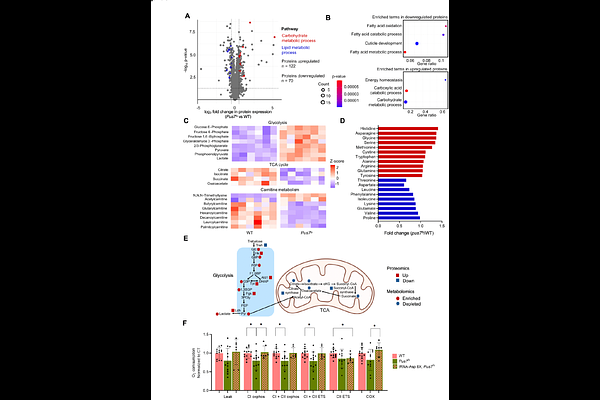Pus7 mutation links tRNA dysregulation to aggressive behavior through activation of the integrated stress response and glycolytic reprogramming

Pus7 mutation links tRNA dysregulation to aggressive behavior through activation of the integrated stress response and glycolytic reprogramming
Stock, M.; Guillen-Angel, M.; Witzenberger, M.; Nowak, J.; Biela, A.; Chramiec-Glabik, A.; Mariano, V.; Dreos, R.; Sklias, A.; Quadroni, M.; Brummer, A.; Gallart-Ayala, H.; Ivanisevic, J.; Guex, N.; Kleenman, L.; Leidel, S.; Helm, M.; Bagni, C.; Glatt, S.; Gatfield, D.; Schwartz, S.; Roignant, J.-Y.
AbstractPseudouridine ({Psi}) is a prevalent RNA modification found in multiple RNA species. It is deposited by {Psi} synthases (Pus) and it can stabilize RNA structures. Patients carrying alterations in the Pus7 gene suffer from developmental delay, intellectual disability, microcephaly, hyperactivity and increased aggression levels. Here we show that the Pus7 mutation in human patient cells and in a Drosophila model is associated with a specific decrease of tRNA:Aspartate (tRNA-Asp) levels, which leads to slow decoding at Aspartate codons. This in turn activates the integrated stress response and induces a metabolic shift towards increased glycolysis and reduced mitochondrial respiration. Elevating tRNA-Asp expression, inhibiting the integrated stress response or dampening the glycolytic pathway is sufficient to rescue the aggressiveness phenotype, demonstrating the involvement of the tRNA-Asp-ISR-glycolysis axis in this behavior. Together our data provide new insights into the molecular defects associated with the loss of Pus7 and suggest potential new avenues for therapeutic treatment.